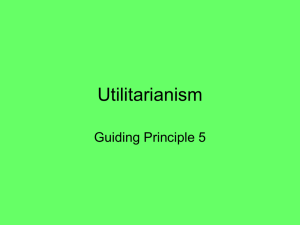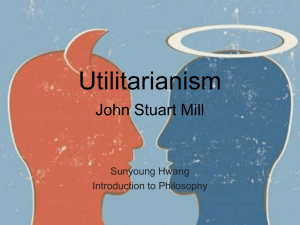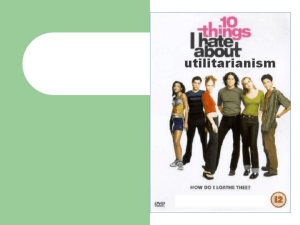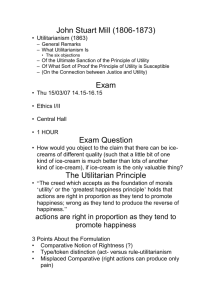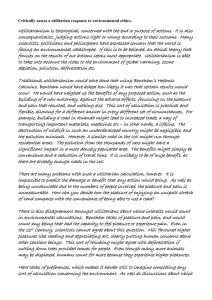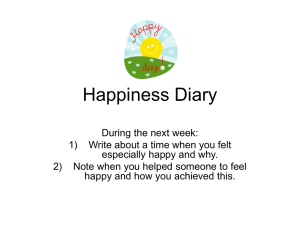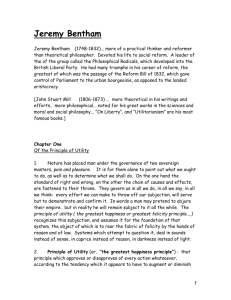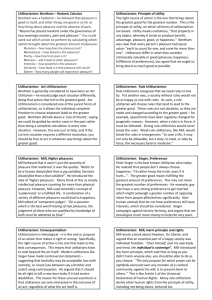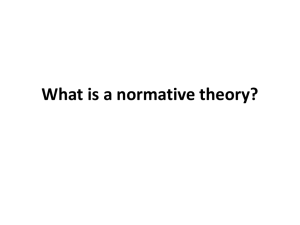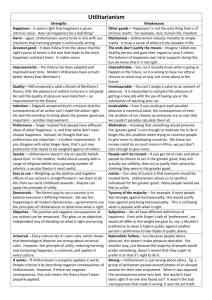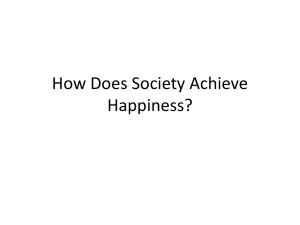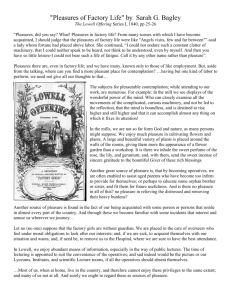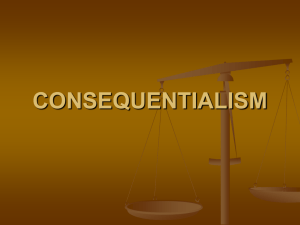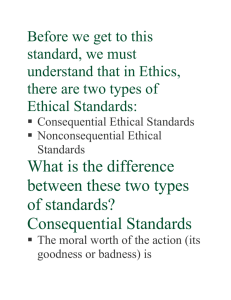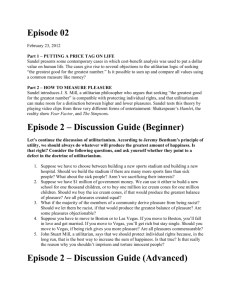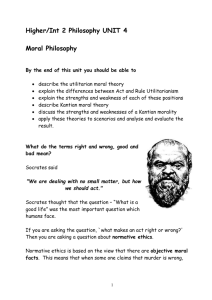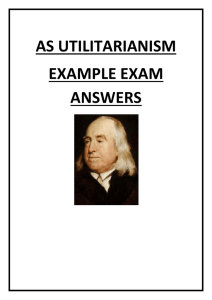Notes on Utilitarianism
advertisement
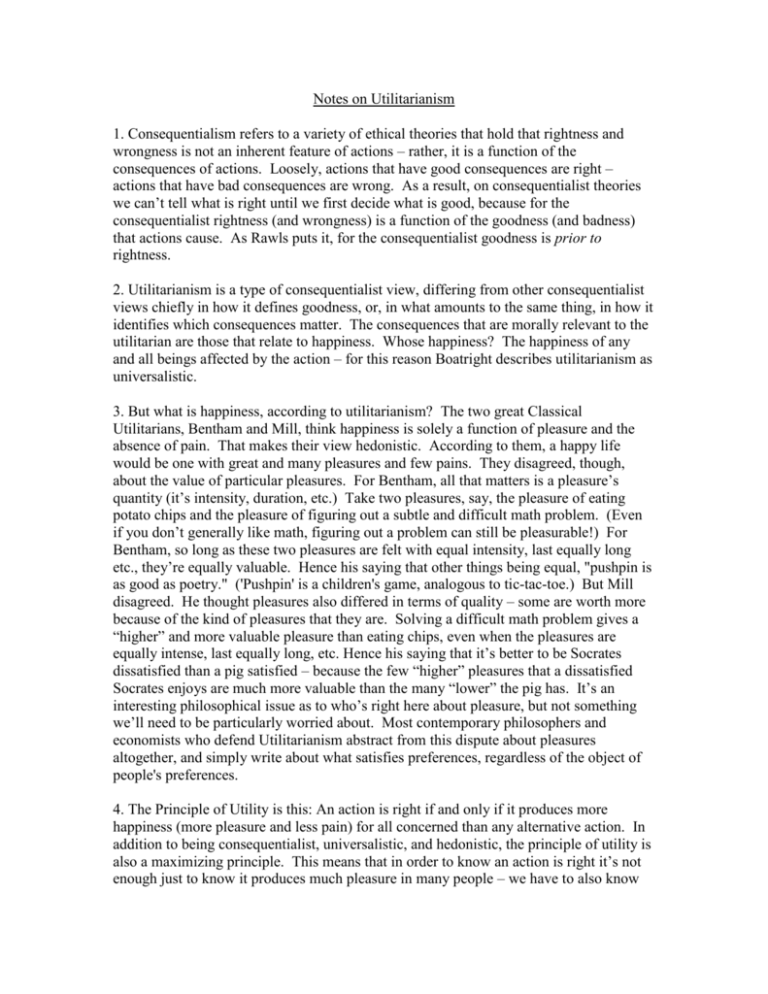
Notes on Utilitarianism
1. Consequentialism refers to a variety of ethical theories that hold that rightness and
wrongness is not an inherent feature of actions – rather, it is a function of the
consequences of actions. Loosely, actions that have good consequences are right –
actions that have bad consequences are wrong. As a result, on consequentialist theories
we can’t tell what is right until we first decide what is good, because for the
consequentialist rightness (and wrongness) is a function of the goodness (and badness)
that actions cause. As Rawls puts it, for the consequentialist goodness is prior to
rightness.
2. Utilitarianism is a type of consequentialist view, differing from other consequentialist
views chiefly in how it defines goodness, or, in what amounts to the same thing, in how it
identifies which consequences matter. The consequences that are morally relevant to the
utilitarian are those that relate to happiness. Whose happiness? The happiness of any
and all beings affected by the action – for this reason Boatright describes utilitarianism as
universalistic.
3. But what is happiness, according to utilitarianism? The two great Classical
Utilitarians, Bentham and Mill, think happiness is solely a function of pleasure and the
absence of pain. That makes their view hedonistic. According to them, a happy life
would be one with great and many pleasures and few pains. They disagreed, though,
about the value of particular pleasures. For Bentham, all that matters is a pleasure’s
quantity (it’s intensity, duration, etc.) Take two pleasures, say, the pleasure of eating
potato chips and the pleasure of figuring out a subtle and difficult math problem. (Even
if you don’t generally like math, figuring out a problem can still be pleasurable!) For
Bentham, so long as these two pleasures are felt with equal intensity, last equally long
etc., they’re equally valuable. Hence his saying that other things being equal, "pushpin is
as good as poetry." ('Pushpin' is a children's game, analogous to tic-tac-toe.) But Mill
disagreed. He thought pleasures also differed in terms of quality – some are worth more
because of the kind of pleasures that they are. Solving a difficult math problem gives a
“higher” and more valuable pleasure than eating chips, even when the pleasures are
equally intense, last equally long, etc. Hence his saying that it’s better to be Socrates
dissatisfied than a pig satisfied – because the few “higher” pleasures that a dissatisfied
Socrates enjoys are much more valuable than the many “lower” the pig has. It’s an
interesting philosophical issue as to who’s right here about pleasure, but not something
we’ll need to be particularly worried about. Most contemporary philosophers and
economists who defend Utilitarianism abstract from this dispute about pleasures
altogether, and simply write about what satisfies preferences, regardless of the object of
people's preferences.
4. The Principle of Utility is this: An action is right if and only if it produces more
happiness (more pleasure and less pain) for all concerned than any alternative action. In
addition to being consequentialist, universalistic, and hedonistic, the principle of utility is
also a maximizing principle. This means that in order to know an action is right it’s not
enough just to know it produces much pleasure in many people – we have to also know
that it produces more pleasure and less pain overall than any alternative action would
have produced. Alternatively, to know an action is wrong, we need to know more than
the fact that it produces much pain in many people, since maybe any action in that
situation would have produced much pain. (Think of President Truman’s decision to
either drop the atomic bomb on Japan or let the war drag on – either way, many people
die.) We would need to know that an alternative action would have produced less pain
and/or more pleasure. Further, despite the slogan, “the greatest good for the greatest
number,” it doesn’t follow that an action is right just because it positively affects more
people than the alternatives. We also need to know how much it affects them – what
matters is not the number of people but the overall amount of pleasure and minimization
of pain produced.
5. Two complications: First, because a person thinks she is doing something that
maximizes happiness (and minimizes unhappiness), it doesn’t follow that the person does
the right thing. What matters is the reality, not someone’s perceptions or motivations. If
you’re trying to help, but still doing something sure to lead to disaster, it’s still wrong,
according to the Utilitarian. Second, there’s a debate among Utilitarians about whether
it’s the actual consequences or the reasonably expected consequences that count. On the
actual consequences view, an action could turn out to be wrong because it had some
disastrous but totally unexpected consequences that the agent couldn’t have foreseen, or
for that matter, right because of some wonderful and yet entirely accidental
consequences. This makes the theory less plausible, generally, and for this reason we’ll
stipulate that it’s the reasonably expected consequences that count. (Reasonably
expected consequences are still different from what the agent may actually expect.) But
how then do we take merely possible consequences into account? Multiply the possible
consequences by their likelihood. (Something with a 10% chance of producing 100 units
of pleasure, for example, goes on the scale as .1 x 100, that is, 10.)
6. So far, we’ve been talking about what’s called Act Utilitarianism, because we’ve been
speaking as though what makes the action right or wrong is the (reasonably expected)
consequences of that action, and no other. But there are good reasons for Utilitarians not
to be Act Utilitarians. For one thing, it seems quite possible for actions to be wrong and
yet still have maximally beneficial consequences, and vice versa. One way around this is
to shift to what’s known as Rule Utilitarianism. For Rule Utilitarians, particular actions
are right or wrong depending on their relationship to justified moral rules. Thus, if an
action is bribery, and there’s a justified rule that says, “Never bribe,” the action would be
wrong even if the consequences of this particular action were better than any alternative.
What makes the view Utilitarian is the idea that rules are justified if the general
observance of that rule has better overall consequences (with respect to happiness) than
any other rule. This view is still consequentialist, maximizing and universalistic, but only
indirectly so, since these are aspects of evaluating particular rules, not individual actions.
Another way to express the contrast with Act Utilitarianism is to say the Rule Utilitarian
is concerned not with particular actions, but with action types.
